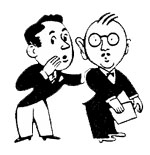
On Selling One’s Soul to Catholic Inc.
CATHOLIC PROFESSIONALS VS. PROFESSIONAL CATHOLICS
As much as I disagree with his ideas and beliefs, I highly respect Doug Wilson. A Protestant pastor from Idaho, Wilson is known for being a bit of a wild man in the safe and winsome Evangelical world. He calls it as he sees it, no matter the consequences. Given that he is an Evangelical, he has the freedom to do as he pleases — what else would we expect from a Protestant? — so he has amplified his views and those of his likeminded coreligionists by establishing his own publishing house and growing a media empire. If you ask him, Wilson will tell you he did so in order to make sure he wouldn’t be at the mercy of “Big Eva,” short for “Big Evangelical,” which is to say, the commercial wing of acceptable, mainstream, centrist Christian thought. To be welcomed by Big Eva, you must be photogenic, likeable, and able to deliver a message that is conservative — but not too conservative! — and doesn’t offend those curious about Evangelicalism with rabble-rousing claims. If the powers that run Big Eva want him to tone it down at conferences or in his books, Wilson is under no obligation to do so because he is his own boss.
Naturally, things are a bit different in the Catholic world. Most importantly, we have a hierarchical Church, and for good reason. We have structures of authority that ideally govern right belief (orthodoxy) and right practice (orthopraxy). Therefore, in the Catholic Church, a man cannot establish a “Catholic” institution without approval from the proper ecclesial authorities. To be sure, authority is, by nature, a good thing, and all men must live under some kind of authority. Even Satan is under authority: He does his nefarious work at the service of God, who permits him to tempt us — for our sanctification. Furthermore, Satan exists in his own sort of “lowerarchy,” as C.S. Lewis called it in The Screwtape Letters. The point being that in the Catholic Church there is no escaping authority and the order of hierarchy, nor should there be.
But, in the current era of Church history, when things are, shall we say, less than ideal, difficulties arise from this. We will focus here on the challenges facing those of us who try to make a living as Catholic professionals.
I say Catholic professional, as opposed to professional Catholic, as this is a distinction that is not without a difference. A Catholic professional is, simply put, someone who makes a living working for the Church or for the good of the Church. He may be a layman who works at a Catholic school or for a diocese in some administrative role. In addition, there are plenty of Catholic authors — myself included — who have not been called upon by the Church officially to write on Catholic topics but who choose to do so out of a sense of duty and for the salvation of souls.
You May Also Enjoy
The Fathers of the Church: From Clement of Rome to Augustine of Hippo. By Pope Benedict XVI... The Loser Letters... Toward the Gleam
The spiritual dimension of the abortion business is its systematizing of ritual blood sacrifice to the god of child murder who, in the Old Testament, is called Moloch.
The citizens of Oceania are not only stripped of human freedom and basic rights but so dehumanized that each individual lacks any semblance of human dignity.

